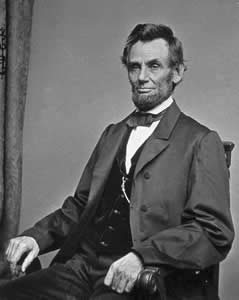This Week in History
February 8-14, 2015
Dispatch from the Committee of Correspondence,
February 12, 1861
President-Elect Abraham Lincoln Sets Out for Washington;
Celebrates His 52nd Birthday in Indiana and Ohio
By Pamela Lowry

Abraham Lincoln. |
Our "This Week in History" column is pleased to post contributions from the extended American "Committee of Correspondence".[1] Historian Pamela Lowry reports on the historic event as if from on the scene. Additional material was contributed by Charles Notley.
February 12, 1861--President-elect Abraham Lincoln celebrated his fifty-second birthday in both Indiana and Ohio today as he began his three-week trip by railroad to his inauguration in Washington, D.C. Mr. Lincoln's progress to the capital will be interrupted by many public receptions and speeches, as he has accepted official invitations from the Governors and Legislatures of Indiana, Ohio, Pennsylvania, New York, and New Jersey. Yesterday, Mr. Lincoln addressed a large gathering at Indianapolis, and today he has spoken at receptions in Cincinnati and Columbus. His itinerary then includes Cleveland, Pittsburgh, Buffalo, Albany, and New York City. In Philadelphia, on George Washington's birthday, Mr. Lincoln will raise the Stars and Stripes over Independence Hall.
With seven Southern states having already seceded from the Union during the past three months (S. Carolina on Dec. 20; Mississippi on Jan. 9; Florida on Jan. 10; Alabama on Jan. 11; Georgia on Jan. 19; Louisiana on Jan. 26; and Texas on Feb. 1), outgoing President James Buchanan has done nothing to stem the tide. Federal installations across the Deep South have been seized by the secessionists, including the U.S. Mint and Customs House at New Orleans; the federal arsenal at Charleston; Forts Pulaski and Jackson at Savannah; and the federal arsenal at Mobile. What measures Mr. Lincoln will take after assuming office no one yet knows, but so far he has avoided any note of stridency in his speeches, hoping that precipitate action by N. Carolina, Tennessee, Virginia, or Missouri can still be avoided.
But Mr. Lincoln has made it clear in his addresses to the citizens crowding to hear him, that it is not he alone who will decide the fate of the nation. To a large crowd at Missouri and Washington streets in Indianapolis, Mr. Lincoln stated:
“If the Union of these States and the liberties of this people shall be lost, it is but little to any one man of fifty-two years of age, but a great deal to the thirty millions of people who inhabit these United States, and to their posterity in all coming time. I appeal to you again to constantly bear in mind that not with politicians, not with Presidents, not with office-seekers, but with you, is the question, Shall the Union and shall the liberties of this country be preserved to the latest generations?”
Standing in a carriage and acknowledging the greetings of well-wishers, Mr. Lincoln made his way in a parade along Washington St. that ended at the prestigious Bates House hotel. From a balcony he acknowledged a crowd of 20,000 people and made a second speech that again questioned the right of the Southern states to secede from the Union without the concurrence of the rest of the nation.
This wasn’t Mr. Lincoln’s first visit to Indianapolis. On his way to take his seat as a Whig member of Congress, in 1847 Mr. Lincoln stayed at the Browning House, another prominent hotel on Washington St., and was greeted by lawyers and politicians. And, in the fall of 1859, to a large crowd at the Masonic Hall, Mr. Lincoln won national attention campaigning for the U.S. Senate in Illinois. The then potential candidate for President asserted in a debate with Democrat Stephen A. Douglas that “government cannot endure permanently half slave and half free,” and “a house divided against itself cannot stand.”
Footnote
[1] The Committees of Correspondence, best known from Benjamin Franklins’ work, were the American colonies’ means for maintaining communication lines in the years before the Revolutionary War. In 1764, Boston formed the earliest Committee of Correspondence to encourage opposition to Britain’s stiffening of customs enforcement and prohibition of American paper money. The following year, New York formed a similar committee to keep the other colonies notified of its actions in resisting the Stamp Act. In 1773, the Virginia House of Burgesses proposed that each colonial legislature appoint a committee for intercolonial correspondence. The exchanges that followed built solidarity during the turbulent times and helped bring about the formation of the First Continental Congress in 1774. The Committees continued to function in the following years as a US Intelligence Service.
